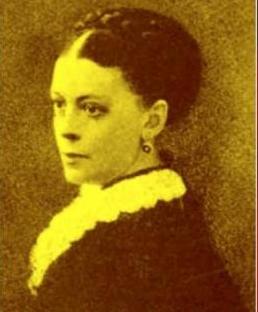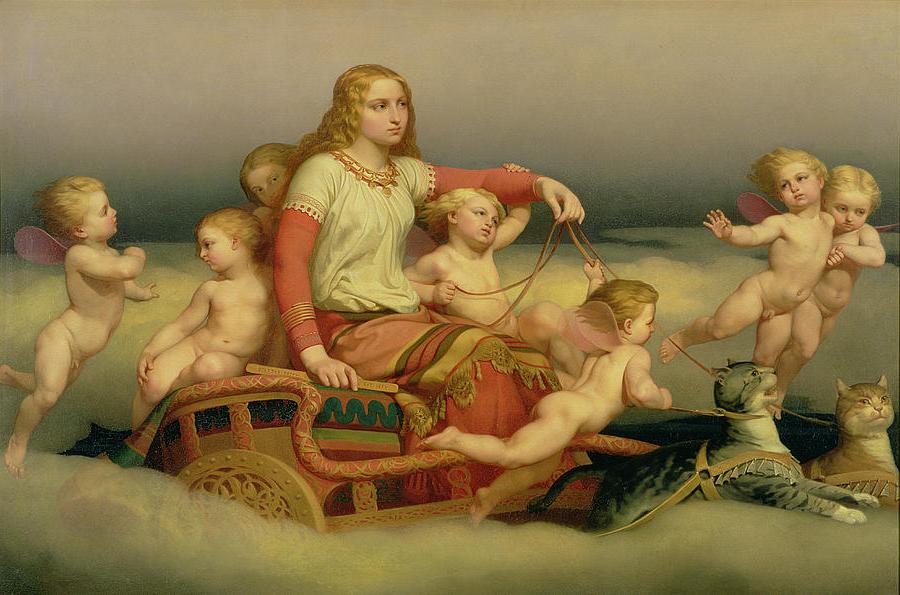Susan Coolidge
American Civil War Era
Author & Poet
(1835-1905)

[POPULAR RETELLINGS]
With
a Wagnerian understanding of the mythology, Susan Coolidge
penned a delightful poem concerning Freyja and the building of
Asgard's wall some time before her death, and published
posthumously. Like Richard Wagner, she conflates Freya and Idun
into a single goddess, having Freya distribute Idun's golden
apples. In Snorri's tale from the Prose Edda, the
giant builder demands Freya, the sun and moon as his wages, but
here just Freyja who may be a symbol of Love. From a synopsis of
Wagner's Das Rheingold in Opera Stories
(1904): Wotan and Fricka behold for the first time the new castle of Walhalla which the giants Fafner and Fasolt have built for them. Freya, goddess of eternal youth, rushes in and begs for protection from the giants; Wotan had promised that she should be theirs as reward for their labor in building the castle. Thor and Froh, brothers of Freya, try to protect her. Wotan reminds them that the compact must be kept. Nevertheless, he anxiously awaits the return of Loki, whom he has sent to search the whole world for a suitable ransom for Freya. At length Loki appears; he has found among all peoples that "woman's worth and love" are held priceless. The gods are in despair at the prospect of losing Freya. Loki relates the story of the theft of the Rhinegold, declaring that Alberich alone of all creatures valued gold above woman. Then he describes the wonderful properties of the gold in such glowing terms that the greed of the giants is excited and they announce that they will exchange Freya for the treasure. Meanwhile they hold Freya as security. As they lead her away, the gods visibly grow older, having lost eternal youth. |
||
|
The Price of Freya |
||
|
(Freya, in the Scandanavian mythology, was the goddess of Youth and Hope. While she remained with the gods and fed them daily with her golden apples they were all powerful; but when Wodin parted with her as the price for the building of Walhalla, they suddenly became weak and weary, and a shadow rested over the world. Walhalla was of no worth without Freya.) The towers are strong and the towers are fair As they rise and gleam in the sunlit air, With bastion and battlement and spire Built for one rule and one desire; Fain would we enter there and sway, But the giant builder the door secures, And mutters his price as he bars the way: "Give up Freya and all is yours." There in the citadel fancy built Are the riches of ages heaped and spilt; Diamonds glitter and rubies gleam, And moon-like pearls front the pale moonbeam. Golden the roof and gold the floor; The glittering splendor wooes and lures; And the tempting voice repeats once more: "Give us Freya and all is yours. "What! give up hope with its rainbow sheen, Give up the sparkle, the song, the jest, The vision of something dreamed not seen, Which is sweeter by far than the thing possessed? The flowers of May and the roses of June. The sweet spring-breath of the April breeze, The dew of morn and the light of noon— When we give up Freya, must we give all these? But we give; and we enter the towers of pride, And we thread our gems and we count our gold; And we bid our hearts to be satisfied With so much to have and so much to hold. But the smile is faded from the day; Our drink is bitter, our bread is stone— And amid the shadows we sit and say: "Nothing is worth with Freya gone." |
||
 Freyja Seeking Her Husband by Nils Blommér 1852 |
||
[POPULAR RETELLINGS]